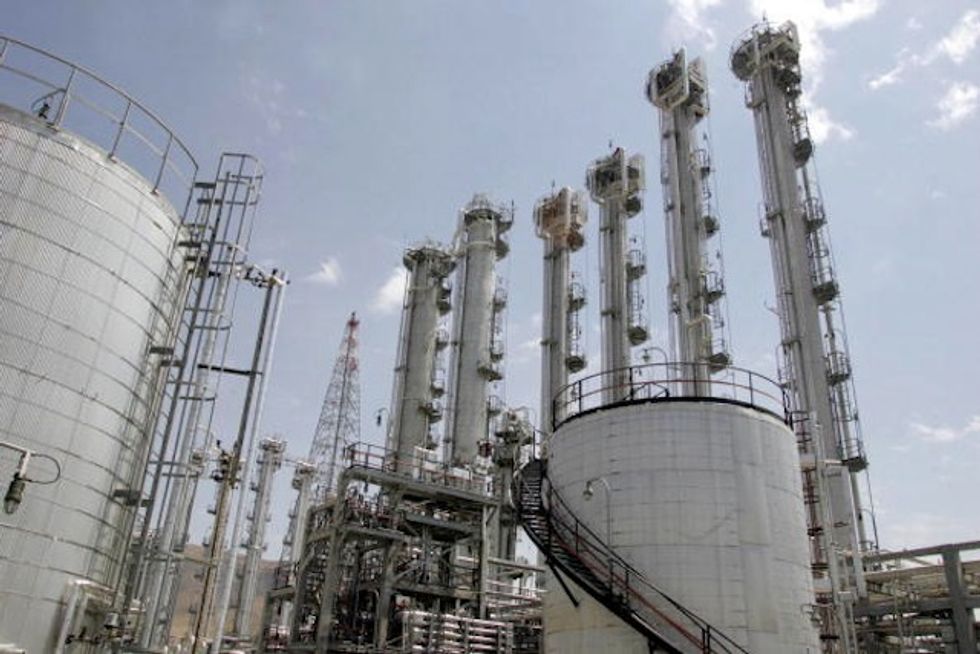
A general view of a heavy water plant in Arak, August 26, 2006. (Photo: Atta Kenare/AFP/Getty Images)

On Sunday the Iranian Parliament voted against international inspections of Iranian military nuclear sites.
With a June 30 deadline approaching for an agreement on Iran’s nuclear weapons program, this action once again raises questions about Iran’s intentions and whether or not it can be trusted as a good faith partner in pursuit of regional security.
The issues surrounding Iran’s nuclear program, and its wider set of security ambitions, are multi-dimensional and complicated. Iran sits between two countries at war (Afghanistan, Iraq) and it borders the nuclear-armed rivalry of Pakistan vs. India. Iranian experts and proxies are involved in fighting in Iraq and Syria, and to a lesser extent, in Yemen and Lebanon. Consequently, Iran’s traditional adversaries are anxious (Israel, Saudi Arabia, Egypt).

Everyone is well-familiar with the fact that there is an intra-civilizational war of ideas going on between Shiite Iran and its Sunni neighbors. But, what few in the West realize is that both sides consider themselves to be minorities fighting an existential fight. Iran’s neighbors feel that it is a Shiite rogue with a history of violent disruptive behavior. Iran’s 78 million people dwarf most of its neighbors: Afghanistan (30 million), Iraq (31 million), Saudi Arabia (27 million), Jordan (6 million), Syria (22 million), Lebanon (4.5 million), Turkmenistan (5 million), Israel (7.6 million).
On the other hand, Iranians feel outnumbered 10:1 by Sunnis around the world. And some of their historic antagonists, such as Saudi Arabia and Israel, are close allies of that proverbial “Satan of the West,” the United States. It does not help that the past thirty years of rule by Khomeini, Khamenei and their ilk has resulted in a religious ideology that nourishes a sense of victimhood, self-flagellation, and martyrdom.
With this in mind, does Iran really want a nuclear deal? If by “deal” one means, does Iran want limits on its security ambitions, including a Shiite bomb, then the answer is no. If Iran, like North Korea before it, wants to engage in zig-zag diplomacy that leads along well-intentioned Western leaders while it continues to advance its programs, it seems entirely capable of doing so.
Indeed, the past decade suggests that this is precisely what Iran has done. It has taken every possible step to inexorably move its nuclear weapons program either to full consummation, or to a “rapid break-out” status. Indeed, the fig leaves of medical research and civilian energy production are no longer covering Iran’s agenda, as the recent Parliamentary vote indicates. Iran wants the bomb. Iran will get the bomb unless robust action is taken.
Moreover, even if a large portion of the Iranian citizenry is not generally supportive of the ayatollahs running the country, nonetheless they do want the bomb. Surveys tell us that Iranians remain patriotic and a majority of them do want the country to enter the nuclear club for reasons of national security and national pride.
Can Iran be trusted in a nuclear deal? This is a country that represses and tortures its own citizens, sends foreign fighters across its neighbors’ soil, trains and encourages terrorists, mocks international law, and has threatened Europe and the United States. If it was just crazy talk, like Moammar Gaddaffi in his final years or some African potentate, then there really would not be cause for international alarm. But, Tehran is an international outlaw and needs to be stopped.
For the U.S. to agree to any nuclear deal, at a minimum there must be positive answers to the following questions.
-What practical steps are included in the agreement for robust verification?
-Is there the political will to punish Iran should it fail to live up to its promises?
-Is the likely outcome increased regional security?
-Is the agreement likely to increase or decrease nuclear non-proliferation worldwide?
It is probably too late at this point to entirely stop an Iranian bomb, in part due to the weakness of the international community. When it comes to U.S. policy for the past six years, the Obama administration seems to have had two fundamental goals for greater Middle East policy.
The first was disengagement from boots on the ground in Iraq, Afghanistan, and elsewhere. The second was the Iranian peace deal. The only way that we can understand many of the other policy actions (or inactions) by this Administration when it comes to the region is to believe that these two goals drive foreign policy (e.g. the U.S. approach to Israel, the administration’s unwillingness to arm the Kurds, the administration’s unwillingness to hammer Turkey on Islamic State terrorist transit, etc.).
It seems as if Obama hopes that an Iran nuclear deal will be the piece of paper that will validate his Nobel Peace Prize, regardless of the consequences after he leaves office.
Eric Patterson, Ph.D. is Dean of the Robertson School of Government at Regent University in Virginia Beach, VA. He is the author or editor of eleven books, including Ending Wars Well and Ethics Beyond Wars End.
–
TheBlaze contributor channel supports an open discourse on a range of views. The opinions expressed in this channel are solely those of each individual author.